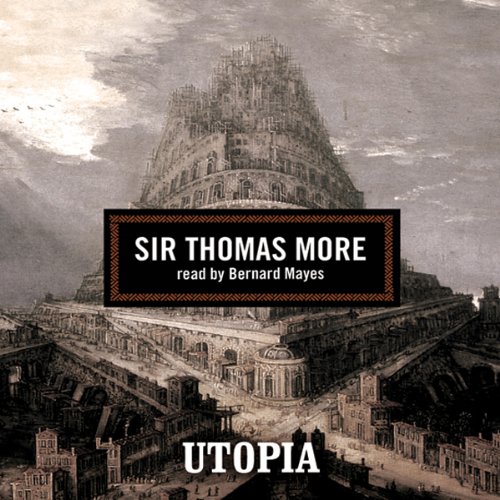Before diving into this review, I think that it is important to point out that this book is pretty much the definition of dated. It was written in 1551, and so what Utopia looked like to someone from the 1550’s is extremely different than what Utopia would look to someone from the 2020’s. Narrative wise, the plot is that an Odysseus type sailor (Raphael) stuns dinner guests with his worldly knowledge and logical political views, and then proceeds to describe the country of Utopia to everybody. So it becomes a soliloquy of Sir Thomas More’s idea of a perfect society.
The Utopia of Sir Thomas More centers on its people, who are homogeneous in their beliefs, ethics, and behaviors. Its people take pragmatism to its extreme. They live in a moneyless society and do not value goods and wealth but rather the simple pleasures of gardening and sport as well as the mental pleasures of education. Everyone is expected to work and they appear to take pleasure in it. People rotate in and out of jobs as needed throughout the seasons. Everyone is expected to know both a trade that is used as needed, and to help with the agriculture. Society is focused on the town and estate level, where families rotate into the position of head family and people take turns working under them. Excess workers are transferred from the cities to the farms during harvest season, so crops are harvested quickly and thoroughly. Everyone seems to tend to their own garden, and estates/houses are simple but beautiful, but no one lives in a single house for longer than ten years, as Utopians rotate where they live. No one goes hungry as food is served communally for the town, where a single estate provides the meal at a time. Because everyone works, people generally only need to work for six hours a day.
People who choose not to work become slaves. Unaccounted for travel is prohibited outside of one’s town, and people who travel without are forced into slavery. Slavery is not only common but is the punishment for nearly all crimes, and every household is reported to have at least two slaves. Men are the undisputed heads of the household, with women restricted to housekeeping duties, in addition to having to confess their sins to their husbands once a month. Premarital sex is punished with forced celibacy for life for both parties. Adultery is punished with slavery. Places for private gathering (taverns, home dining rooms) are non-existent in Utopia, as privacy is considered to be harmful to the state. Private property in general is prohibited. Atheists are despised and while allowed to exist, are considered dangerous to the state.
There are some interesting ideas and some extremely bad ideas. It is worth noting that despite many of the overtly wrong things suggested that make this society a Utopia, it is extremely progressive for a work coming from 1550. It should also be noted that there is debate over why Sir Thomas More actually wrote this. It could have been that More wanted to write about what he thought was an interesting society. He may also have been describing a communist society that was perfect according to communist standards that was clearly impossible to achieve.
Overall, I’m giving this a 2.0/5 not because I disagree with the ideas in it (which I do) but because it was largely a slog to get through. A single character monologuing about a society is just not that interesting to read. It can be done well, in the case of Plato describing many of Socrates’ discussions, but it wasn’t done all that well here.
--Luke Melander

